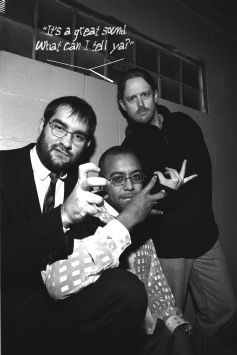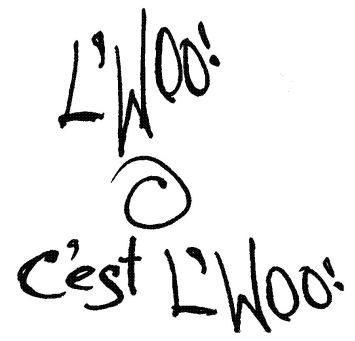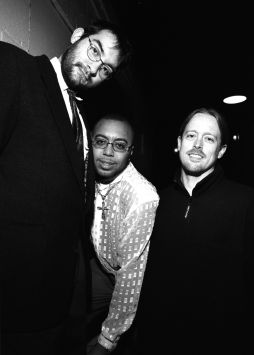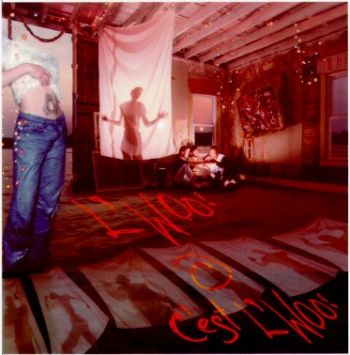social bookmarking tools:
 |
|
| Available RSS Feeds |
|---|
 - Top Picks - Top Picks |
 - Today's Music - Today's Music |
 - Editor's Blog - Editor's Blog
|
 - Articles - Articles
|
Add Louisville Music News' RSS Feed to Your Yahoo!
|

L'WORLD OF L'WOO
By Tim Roberts
Phtos by Ralph Sidway
[Author's Note: The epigrams for the sections of this story are cribbed from lyrics off L'Woo's debut recording C'est L'Woo. Furthermore, the management of Club L'Woo has stated that if you set your CD player to "shuffle" and play C'est L'Woo as you read this story, you will hear the selections in the order in which their lyrics are quoted. Also, if you start the CD after the opening credits, it can be used as a soundtrack to any film from the 1980s featuring Judd Nelson. Honest. Be sure you turn down the volume of the movie first.]
". . .I'm only sure of how I got here."
– from "Wind Shears"
"Happy Valentines Day," I scrawl into my notepad. It is about 1 a.m. on Saturday morning February 14 at one of Louisville's more eclectic venues, the Rudyard Kipling, that features Celtic music one night, folk music the next, then has some plays and poetry readings. It's like programming on a public radio station, but live and in person and without weather forecasts.
My eyes turned blurry. I blinked hard twice to clear them and lifted my head to scan the room. There were about 10 of us remaining in the audience. The room had been busy that night. The Java Men started playing around 10:45, soon after an amateur production of Thornton Wilder's The Skin of Our Teeth.
L'Woo took the stage shortly after midnight. An hour later, they were pushing to finish their set. Things were getting silly, with lots of banter between the band members. The early-morning slap-happiness didn't get in the way of their performance of "All Hands," a soft, harmonically challenging and gorgeous selection from their debut CD, C'est L'Woo. Despite the late hour and the silliness that went on minutes before, the song came off clean and raised goose-bumps, just like the version on the CD.
Written by L'Woo's Danny Kiely, "All Hands," gentle enough to be played on lithium-lite rock radio, is one of the softer spots on C'est L'Woo, a recording that seems hard to decipher at first. It comes off as noisy, bizarre, hard-to-digest at first, filled with some odd-syncopated rhythms, bass-heavy soul, multi-layered vocal tracks and tricks, puzzling lyrics that ask for your attention, where something different draws you in each time you listen. After each listen, you are able to brush away a little more of the rough patina between you and the band. Each time, as stated in "All Hands," you are able to "Pass your hand closer to the surface" before you can put "all hands on and over."
As with a few very fine wines, acquiring a taste for L'Woo can take lots of trying and sampling. Fortunately, you never have to worry whether or not it can be served with fish.
"It's a great sound. What can I tell ya," said Danny Kiely, the night we sat around the kitchen table of Ray Rizzo's home in St. Matthews, where we talked about L'Woo's history, its style of music, and the direction the band hopes to take. Right now, the band's career is all self-directed; the recording was self-produced; shows are self-promoted. With the first CD in the stores since last summer, L'Woo is, like other bands at this stage, planning on the next steps: professional management, more gigs outside the city. In short, broader exposure.
". . .she points out once she owned a pony with my same name."
– from "Fire On Louisa"
L'Woo has a history that reaches back to the late 1980s, when drummer Ray Rizzo, bassist Danny Kiely, and keyboardist/saxophonist Mauriece Hamilton played together in Lovesauce & Soulbones. Before that were stints with The World and, for a while in college, the Bellarmine Jazz Trio (Plus One). But Lovesauce was, as Ray put it, the first group where "we began writing our own material, doing truly original music. We were dealing with a group that, although it had its genre boundaries, it was pretty much a blank slate and we were pushed in a different way. We developed from a creative niche we liked scratching."
The trio also manages to scratch their individual niches in other ways. When he's not with L'Woo, Ray is also drummer for King Kong and the Java Men, arguably Louisville's most innovative jazz trio. Danny has played bass several studio gigs and also did a stint with BeebleBrox, the Bloomington, Indiana-based jazz outfit. His work is on their recent release Indianapolis Intergalactic Spaceport. (reviewed earlier this year in the LMN) Mauriece, however, has a non-music job as an evaluating engineering technician at GE Appliance Park, testing washers and dryers designs before they go into production. With all the uncertainty of Appliance Park's future in Louisville, Mauriece is awaiting L'Woo's obvious next step as a band – getting the broader exposure – which can't come soon enough for him.
After scratching around with Lovesauce for a few years, the three began performing together under the moniker of L'Woo, a name which, according to the band, has a story behind it. But it is a story they are tired of telling. Besides, why bother, according to Ray. "Anyone who knows the city of Louisville knows that it's the city of bands with bad names."
He does, though, acknowledge the source. "Mauriece did come up with it. It was the best of our worst possible names."
"It makes it memorable," Mauriece added.
Consider, though, what "woo" means: a come-on, a flirtation, a mild seduction. And then consider their music: the rhythmic, melodic, and lyrical acrobatics that slowly pull you in each time you listen, like the book you try to read but keep putting down until that moment when it clicks itself open to you.
Or just take Danny Kiely's explanation. "We might call our next album 'Little Women of Ohio'," retrofitting the L'Woo name as an acronym just to keep from repeating that damned name story again.
"A cage has left in search of birds."
– Franz Kafka. Also from "All Hands"
What is the sound of L'Woo? The sound that seduces and challenges? What can best describe it? What's the comparison? How can it be easily labeled so that a new record store employee doesn't file it under World Music? ("Gee, boss, they've got a foreign-sounding name.")
"It's definitely an evolving sound," Danny Kiely said. "We're three musicians trying to do the work of more." Part of that work includes guitarist Todd Johnson, who's played with them on the CD and who has also been with filling in that part for the last six months.
"The sound on the CD," Danny said, "is much the same as you get live. We're interpreting a lot of the songs as just a three-person or four-person group, which makes [the material] take on a different character. The fact that the three of us have been playing together so long has developed a common language we approach things with. So its natural for us to always sound like Mauriece, Ray and Danny."
But the sound Mauriece, Ray and Danny used on C'est L'Woo used several voices and guest instrumentalists. Since they have played together in different band concepts over a decade or so, they know each others' capabilities.
"It makes us more resourceful, if anything," Danny said.

Ray gave his views on their sound. "I really don't think [it] is that much of a stretch," Ray said. "There are obviously other groups we are compared to, and on some levels I appreciate it."
So, then, who are these groups to whom some have compared L'Woo? Steely Dan is one, Ray said, with their melding of jazz and slick pop influences and lyrical complexity. The Police is another, perhaps from blending the natural, organic sound of reggae and the edginess of punk.
"In a very sincere sense," Ray continued, "where that comparison is most valid is that these [others] are artists that are inspired by very different styles and trying to bring it together into a cohesive thing. We're definitely one of those lucky groups where our inspirations come from a lot of places but the sound is just the way it is all put together."
I thought back to the first time I played C'est L'Woo and was introduced to them via the opening track, "Fire on Louisa." I instantly recognized the style of another unconventional musician. The rhythm bouncing from 5/4 time during the verse, then to 4/4 and a measure of 2/4 in the chorus. The vocals where one line is sung at one pitch, a higher – almost girlish – one answers, then with a couple of spoken words. With that opening track, the first name to pop into my head was:
"Frank Zappa," I told them.
Each member of the band instantly said "Yes," in turn. "The comparison there," Ray explained, "we came by completely by accident. I've heard some Zappa I like and a lot I don't like. He was another person who would listen to, say, Stravinsky or Charlie Parker and he created this music that was complex and mathematical. That's why the Frank Zappa comparison drives us nuts the most."
"The fact that we're sincerely trying to bring these influences into the music in a way that we just hear them naturally, we're always gonna be compared to other bands who have done that."
Is the band afraid of being viewed as intellectual, much like Steely Dan, The Police, and Zappa?
Ray stammers a bit. "I have a fear that's the way we are perceived. I don't know whether that's right or wrong. We're certainly not up there—"
"Thinking," Mauriece slipped into the conversation.
Ray continued. "But that's possibly just as much a result of the rooms we've been playing – the Twice Told and the Rudyard Kipling – which has formed peoples' perceptions of us. We seem like we're a group that audiences just sat back and absorbed."
"If I can't hold your attention, may I at least hold your pink mink coat?"
– from "Bonnie"
L'Woo's audience obviously understands their music, appreciates its complexities, which keeps things on an intimate level between them and the band. The instrumentation, though, may be problematic for those seeing L'Woo for the first time.

Ray explained. "When you have a song where the main melody is being played on the bass guitar, that's immediately a challenge for the newcomers to our audience. The one thing our improvisation backgrounds has brought to the group is active performing with every 'voice' on stage, whether its guitar, drums, or vocals. The instruments play different roles in our music, and we're very much playing them in the moment."
"We're having to rethink how we get around obstacles," Mauriece adds. "Like recording a song that has eight or nine different voices in it and then creating a way to have that presence without having all those people on stage. So it has required us to rethink how to use our instruments. For those songs where Danny's on keyboards and I'm on sax, there are no chords. So our vocals tend to be our chordal instruments."
The example offered was, once again, "Fire On Louisa." On the CD, it consists of six vocalists (including the L'Woo trio), a piano and organ, a violin, and a saxophone. L'Woo can perform it as a quartet without the keyboard by using vocal harmonies and adding Todd Johnson's guitar work. "It was one of the most challenging things we had to do," Mauriece stated.
He summarized the band's adventurous instrumentation this way: "In other words, we don't use swings to swing on. We also use them as sliding boards."
"Before we recorded the CD," Ray said, "we were performing the songs as a trio. So I don't know if the CD is a blueprint of the live performance, or if the live performance is a blueprint of the CD. So on a good night, when everything is working, the three of us sound like a huge band. The challenge is to make ourselves sound big."
That big sound was able to fill the Mad Frog in Cincinnati, opening for another band to a crowded room.
Mauriece remembered the evening. "They clapped for our soundcheck."
In spite of being a band which the audience "sits back and absorbs," there have been some shows that were a little exciting. Mauriece said, "We've had one or two where people actually got up and danced. I was kind of uncomfortable with that when we first started playing, but I think a lot of people who come to see us prefer to sit and listen."
Their CD release party-tours within Louisville last summer took them to appreciative crowds at their regular venues, plus a stop at HMV music store in the Mall St. Matthews. And during one performance, L'Woo connected directly with someone in the audience.
"Mauriece's singing made a woman lactate," Ray said.
The way Mauriece explained it: "We were at the Twice-Told, and at the end of the night a friend of the woman [who was lactating] called me over to her table and said every time I was hitting some note, milk would squirt from her breast. Another woman told us we made her salivate."
"Those two people come to see us a lot," Danny said.
"I am a changed man with a master plan. . ."
– from "Verlasta"
As mentioned earlier, L'Woo has plans to search for the larger audience, not by adding more fans locally, but by playing in areas other than Louisville.
"When I first got into the music scene in Louisville," Ray said, "I became familiar with the superstition that no band can make it out of Louisville. There are plenty of bands that go from being hometown heroes to being the next big thing." Days of the New, Edenstreet, and Love Jones being three obvious examples.
"You're dealing with offices many miles away," he added, "who will forget you if you are not staying in their faces."
"The scene is hard on those doing original music," said Mauriece. Danny added, "There's not a whole lot of opportunity to be seen and move ahead."

It seems the experience at the Mad Frog in Cincinnati – getting applause after a soundcheck and playing to a full room – showed the band how different the opportunities are between Louisville and someplace close by. Mauriece remembered the experience. "Not to down my city, but I came away from that gig saying we ought to play in Louisville twice every two months and make Cincinnati our home, if that's what it takes."
"You have to get in where you fit it," Danny said. "We're looking as much in town as we are out of town."
L'Woo is aware of what they need to do. They're looking for some management from someone besides themselves. "It's been a long, hard road for us to write the music, play the music, record the music, and manage it all," Mauriece admitted. "A book I read on band management said not to do that. And we've been doing it."
"We started writing a mission statement," Ray said. So apparently the guys are doing what some corporations do: create a vision, state a mission, look to management and guidance to hold to the mission and take calculated risks. It's the Stephen Covey method of running a band: The Seven Habits of Highly Creative Bands With Often Mispronounced Names.
One thing some corporations do is reach out to the young people in the city, and L'Woo has already done that. They spoke at a career day at the Brown School on February 18 and told the students all about life as a professional musician. They shattered a lot of illusions by telling them how much hard work is involved, the practicing songwriting, recording, late night gigs, trying to make the efforts work, bad rooms and low pay. And the most attention you can get from an adoring fan is for her to tell you that your voice made her lactate.
Still, they payoff can be in the form of memories of good shows, for the band and the audience. Case in point:
Early Valentine's Day morning at the Rudyard Kipling, Ray announced that Mauriece would sing the Rogers and Hart jazz standard "My Funny Valentine" to honor the sweethearts in the audience and wrap up the show. Java Men guitarist Craig Wagner remained after their set, and Ray asked him to get out his guitar and play the last tune with them. As Craig got his guitar ready and the rest of the band chatted among themselves, Todd Johnson began strumming a light soul groove. He was into it for about four bars when Ray and Danny picked it up. Mauriece, who had been seated at his keyboard ready to play the selection as a straightforward jazz piece, stood up, moved the microphone to face the audience, and started singing with the rhythm that the others had laid down.
I had never heard a soul version of "My Funny Valentine" before, complete with a gentle solo from Craig. It was an essence of the seduction from L'Woo: using something in a way it hasn't been used before.
Or, to put it in their terms, they had used a swing as a sliding board.
We had fun playing on it.
L'Woo invites you to correspond with them, especially if you are a band manager looking for fresh professional talent that won't embarrass you. Or even if you aren't, you can still write them at:
The Mandoo Record Co.
PO Box 8179
Louisville, KY 40257-8179
Or reach them on the net at clublwoo@aol.com
They are also available for career day presentations for any of the area schools.
